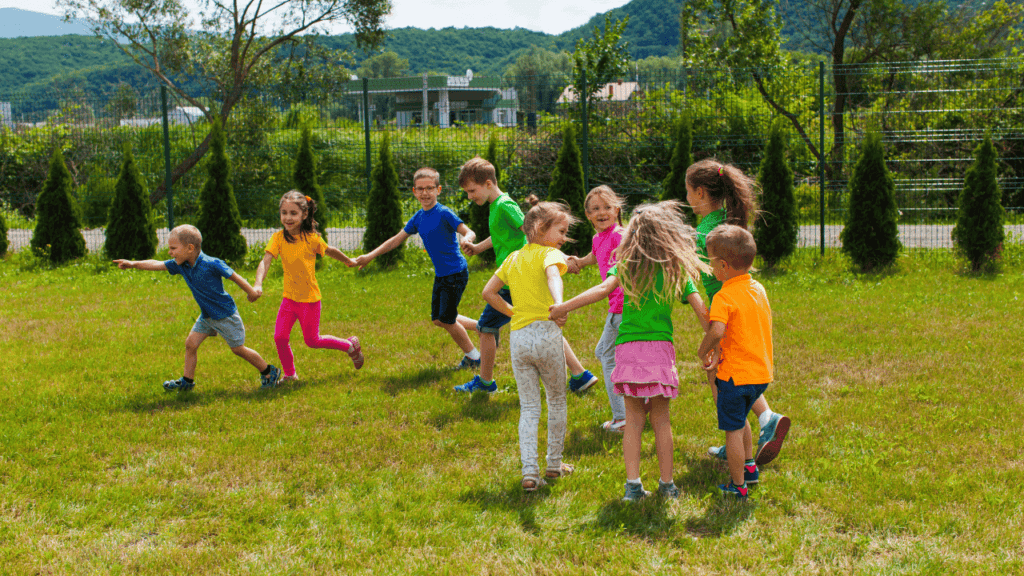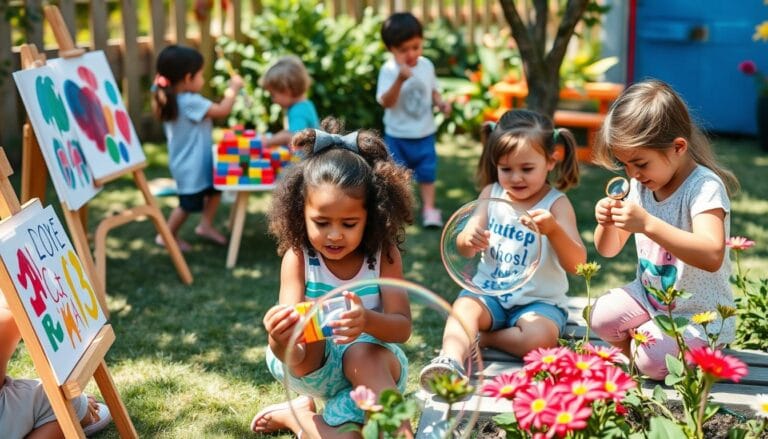
Outdoor Play Benefits for Children Key Insights
Outdoor Play Benefits for Children is not only important for physical activity but also plays a vital role in child development. It helps children socialize, understand their bodies better, engage in imaginative play, and enjoy the outdoors. School-aged children need about three hours of outdoor play each day, which contributes to their physical and emotional health. It also helps reduce the risks of obesity and weight-related health concerns. Outdoor play provides a break from screen time and promotes active engagement with peers and the natural environment. It improves sleep, mood, and social skills, helping children develop healthy ways of forming friendships and solving problems. Finding outdoor spaces can be easy by visiting local parks, recreation websites, or utilizing nature prescription programs.
Key Takeaways:
- Outdoor Play Benefits for Children, including physical, cognitive, social, and emotional well-being.
- It helps reduce the risks of obesity and weight-related health concerns.
- Outdoor play promotes active engagement with peers and fosters the development of social skills.
- It provides sensory experiences that stimulate children’s senses and creativity.
- Outdoor play improves sleep, mood, and problem-solving abilities.
Importance of Outdoor Play for Child Development
Outdoor play is crucial for the overall development of children, providing a wide range of benefits for their physical, cognitive, social, and emotional well-being. Engaging in various outdoor activities not only promotes physical activity but also nurtures important skills and traits that contribute to a child’s growth and success.
One of the primary benefits of outdoor play is its positive impact on physical health. Through unstructured play, children naturally engage in physical activities that help them build strength, endurance, and coordination. Regular outdoor play reduces the risk of childhood obesity and related health concerns, ensuring children establish healthy habits early in life.
Moreover, outdoor play has a significant influence on mental health and emotional well-being. Spending time outdoors allows children to immerse themselves in nature, which can have a calming and soothing effect on their minds. It also promotes better sleep patterns, boosts mood, and enhances concentration and cognitive function.
Outdoor play also provides opportunities for children to develop and refine their social skills. Interacting with peers in an outdoor setting allows children to practice communication, cooperation, and problem-solving. They learn to take turns, negotiate roles, and collaborate, fostering the essential skills needed to navigate social relationships throughout their lives.
Additionally, outdoor play encourages creativity and stimulates cognitive skills. The open-ended nature of outdoor play allows children to explore the world around them, think critically, and solve problems creatively. Nature serves as a vast playground that sparks imagination and curiosity, enabling children to think freely and approach the world with inventiveness.
Overall, outdoor play is an integral part of a child’s development. It contributes to their physical well-being, enhances their social interactions, nurtures cognitive abilities, and fosters emotional resilience. Encouraging children to spend time outdoors and engage in a variety of activities is crucial for their holistic growth.
Key Takeaways
- Outdoor play promotes physical activity, reducing the risk of childhood obesity.
- Time spent outdoors has positive effects on mental health, improving sleep, mood, and concentration.
- Outdoor play enhances social skills by encouraging interaction and cooperation with peers.
- Engaging in outdoor activities stimulates cognitive skills and creativity.
- Overall, outdoor play contributes to the holistic development of children.
Benefits of Nature Play for Children
Nature play offers a wide range of benefits for the overall development of children. Engaging with natural environments provides unique opportunities for sensory experiences, cognitive skills, emotional well-being, and physical activity.
Sensory Experiences: Nature play activates children’s senses as they see, hear, smell, and touch the outdoor environment. The sights of vibrant flowers, the sounds of chirping birds, the scents of fresh air, and the feel of natural textures offer a rich sensory experience.
Cognitive Skills: Exploring nature encourages curiosity and fosters cognitive skills. Children engage in problem-solving, critical thinking, and imaginative play as they observe and interact with the natural world. Nature play stimulates creativity and helps children think freely and inventively.
Emotional Well-being: Spending time in nature promotes emotional well-being in children. The beauty and wonders of the natural world create feelings of pleasure, reduce stress, and alleviate fatigue. Being surrounded by nature helps children develop a sense of calmness and peacefulness.
Physical Activity: Nature play combines physical activity with the benefits of the outdoors. Running, climbing, jumping, and exploring nature’s playground promote healthy physical development. Children engage in natural movements that contribute to their overall physical well-being.
By embracing nature play, children can experience the joy of sensory exploration, develop essential cognitive skills, maintain emotional well-being, and engage in physical activity in a natural and stimulating environment.
Integrating the image above into this section, we visually reinforce the concept of nature play. The image showcases children actively exploring and immersing themselves in the natural world, capturing the essence of the benefits highlighted.
Ways to Encourage Outdoor Play Benefits for Children
Encouraging children to engage in outdoor play is crucial for their overall development and well-being. Here are various strategies to inspire outdoor play:
1. Provide Access to Local Parks and Natural Spaces
Creating opportunities for children to explore local parks, gardens, trails, and wildlife refuges can stimulate their curiosity and encourage outdoor play. Nature offers endless possibilities for adventure, discovery, and physical activity.
2. Engage Children in Structured Outdoor Activities
Structured outdoor activities, such as sports or nature-based programs, can help promote outdoor play and provide opportunities for skill development and social interaction. Encouraging participation in organized activities can be a great way to introduce children to new outdoor experiences.
3. Incorporate Outdoor Elements into Everyday Tasks
Integrating outdoor elements into everyday tasks is a simple yet effective way to encourage outdoor play. Tasks like weeding, watering plants, or hanging clothes on the line can create opportunities for children to engage with nature while accomplishing daily responsibilities.
4. Promote Active Transport Activities
Encourage children to engage in active transport activities like walking or biking to nearby parks or destinations. This not only promotes outdoor play but also teaches them road and pedestrian safety. Active transport activities can be an enjoyable and healthy way for children to explore their surroundings.
By implementing these strategies, parents and caregivers can foster a love for the outdoors, promote physical activity, and support children’s overall development.
Encouraging outdoor play provides children with valuable experiences that contribute to their physical, cognitive, and emotional growth. It helps them develop essential skills, explore their surroundings, and connect with nature. So, let’s make outdoor play a priority and create a world where children can thrive amidst the wonders of the great outdoors!
Outdoor Play for Different Age Groups
Outdoor play benefits children of different age groups in unique ways. It provides valuable opportunities for exploration, physical development, and learning. Here’s how outdoor play can benefit children at different stages of their growth:
Outdoor Play for Babies
Outdoor play is essential for babies as it helps them learn about their surroundings and feel more comfortable with the world. Simple activities like tummy time on a blanket, feeling grass beneath their hands and feet, listening to nature sounds, or observing different objects can stimulate their senses and promote cognitive development.
Outdoor Play for Toddlers
Toddlers greatly benefit from outdoor play as it enhances their exploration skills and physical development. Activities like throwing and chasing balls, walking or running around in nature, engaging in sensory play with sand or mud, or even simply exploring the outdoors foster their curiosity, gross motor skills, and sensory experiences.
Outdoor Play for Preschoolers
Preschoolers thrive during outdoor play sessions that involve interactive games, make-believe play, nature walks, and building or creating things with outdoor objects. These activities promote imagination, social interaction, and fine motor skills. Exploring the natural environment helps them develop a deeper connection with nature and encourages their creativity.
Outdoor Play for School-Age Children
School-age children can benefit from both structured and unstructured outdoor play. Engaging in sports, building and creating, and active play helps them develop physical and cognitive skills, teamwork, and problem-solving abilities. It also provides an opportunity for them to develop independence, explore their interests, and enjoy the benefits of an active lifestyle.
Outdoor play plays a vital role in the healthy development of children at every age. It supports their physical, cognitive, social, and emotional well-being. By ensuring that children of all age groups have access to outdoor play, we can foster their growth, development, and lifelong love for the great outdoors.
Outdoor Play in Different Weather Conditions
Outdoor play can be enjoyed in various weather conditions, offering unique experiences and benefits to children. Whether it’s cold weather or wet weather, there are plenty of exciting activities that children can engage in.
In cold weather:
- Exploring the beach or parks
- Jumping in puddles
- Playing with torches
- Gathering natural materials for creative activities
- Flying kites
In wet weather:
- Jumping in puddles
- Exploring wet parks and gardens
- Collecting natural materials for indoor sorting or painting activities
These outdoor experiences in different weather conditions stimulate children’s senses, promote creativity, and provide opportunities for new and exciting explorations.
Benefits of Outdoor Play in Different Weather Conditions | |
|---|---|
| Cold Weather | Wet Weather |
| 1. Fresh air and exposure to sunlight 2. Physical activity and exercise 3. Development of resilience and adaptability to different environments 4. Exploration of natural elements and textures 5. Enhanced creativity and imaginative play | 1. Sensory experiences with water 2. Learning about cause and effect through splashing in puddles 3. Discovering the joys of nature in a different light 4. Opportunities for indoor activities using natural materials |
Overcoming Barriers to Outdoor Play
While outdoor play is highly beneficial for children, there are several barriers that can impede their ability to engage in it. These barriers include parental fears, safety concerns, and a lack of access to outdoor spaces.
One major barrier to outdoor play is parental fears and safety concerns. Many parents worry about potential dangers such as accidents, injuries, or encounters with strangers. However, research shows that the benefits of outdoor play far outweigh the risks. It is important to educate parents about the numerous advantages of outdoor play and provide them with information on how to ensure their child’s safety while playing outside.
Another barrier to outdoor play is the lack of access to outdoor spaces, especially in urban areas. Many families may not have easy access to parks, gardens, or other green spaces where children can play freely. This can greatly limit their opportunities for outdoor play and exploration.
To overcome these barriers, it is crucial to create awareness and provide resources to support outdoor play. Parent education programs can help dispel myths and alleviate safety concerns, empowering parents to confidently allow their children to play outdoors. Additionally, communities can work together to improve access to outdoor spaces by developing or enhancing local parks, creating nature trails, or implementing nature programs that encourage children to connect with the outdoors.
Strategies to Overcome Barriers to Outdoor Play
To overcome barriers to outdoor play, the following strategies can be implemented:
- Educate parents about the benefits of outdoor play and address their concerns regarding safety.
- Provide resources, guidelines, and recommendations for ensuring the safety of children during outdoor play.
- Advocate for the creation and improvement of local parks, green spaces, and nature trails to increase access and availability of outdoor play areas.
- Collaborate with schools, community organizations, and local authorities to promote outdoor play initiatives and programs.
- Support nature-based education and play programs that encourage children to engage with the natural environment.
By actively addressing these barriers and implementing strategies to overcome them, we can ensure that children have ample opportunities to experience the joys and benefits of outdoor play.
| Barriers to Outdoor Play | Strategies to Overcome |
|---|---|
| Parental fears and safety concerns | Educate parents about the benefits of outdoor play and provide guidelines for ensuring child safety |
| Lack of access to outdoor spaces | Advocate for the creation and improvement of local parks and green spaces to increase availability |
Conclusion
Outdoor Play Benefits for Children is of utmost importance for the healthy development of children, offering a wide range of benefits across physical, cognitive, social, and emotional domains. Engaging in outdoor play helps build confidence, fosters creativity, teaches responsibility, and provides unique sensory experiences. By actively participating in outdoor activities, children can stay physically active, reduce stress, and enhance their overall development.
Despite the challenges and barriers that may exist, it is crucial to prioritize and promote outdoor play for children’s well-being. By creating opportunities for outdoor play, addressing parental concerns, and fostering a love for nature, we can ensure that children fully reap the benefits of this valuable experience.
Key takeaways from this article include recognizing the importance of outdoor play in child development, understanding the diverse benefits it offers, and the significance of actively promoting outdoor play. By encouraging children to spend time outdoors, we provide them with opportunities to develop essential skills, nurture their physical and emotional health, and experience the beauty and wonders of the natural world.
FAQ
What are the benefits of outdoor play for children?
Outdoor Play Benefits for Children provides numerous benefits for children’s physical, cognitive, social, and emotional well-being. It promotes physical activity, enhances cognitive skills, improves social skills, and contributes to emotional well-being. Outdoor play also offers sensory experiences and encourages learning through play.
Why is outdoor play important for child development?
Outdoor play plays a vital role in child development. It helps children develop physically by engaging in unstructured physical activity. It also improves mental health, including sleep, mood, and concentration. Outdoor play promotes social skills, problem-solving abilities, relationships within peer groups, and a respect for nature. Additionally, it stimulates cognitive skills and creativity.
What are the benefits of nature play for children?
Nature play provides additional benefits for children’s development. It offers sensory experiences by engaging children with natural environments, stimulating their senses. Nature play encourages exploration and curiosity, fostering cognitive skills and creativity. It also promotes emotional well-being, reducing stress and fatigue and creating feelings of pleasure.
How can I encourage outdoor play for my child?
You can encourage outdoor play by providing access to outdoor spaces like local parks, gardens, and trails. Engaging children in structured outdoor activities like sports or nature-based programs can also promote outdoor play. Incorporating outdoor elements into everyday tasks and encouraging active transport activities like walking or biking to nearby destinations can also encourage outdoor play.
How does outdoor play benefit children of different age groups?
Outdoor play benefits children of different age groups in unique ways. For babies, it helps them learn about their surroundings and feel more comfortable with the world. Toddlers benefit from outdoor play by enhancing their exploration skills and physical development. Preschoolers enjoy interactive games, nature walks, and building or creating things with outdoor objects. School-age children can benefit from both structured and unstructured outdoor play.
Can children enjoy outdoor play in different weather conditions?
Yes, outdoor play can be enjoyed in different weather conditions, providing unique experiences and benefits to children. Even in cold weather, children can explore outdoor spaces, jump in puddles, or gather natural materials for creative activities. Wet weather also offers enjoyable activities like jumping in puddles or exploring wet parks and gardens.
What are the barriers to outdoor play for children?
Barriers to outdoor play for children include parental fears and safety concerns, lack of access to outdoor spaces, especially in urban areas. By creating awareness of the benefits of outdoor play, educating parents about safety measures, and providing information about local parks and nature programs, these barriers can be addressed.
Why is outdoor play important for child development?
Outdoor play is crucial for child development as it offers numerous benefits for physical, cognitive, social, and emotional well-being. It builds confidence, promotes creativity, teaches responsibility, and provides different sensory experiences. Outdoor play helps children stay active, reduces stress, and enhances their overall development.













